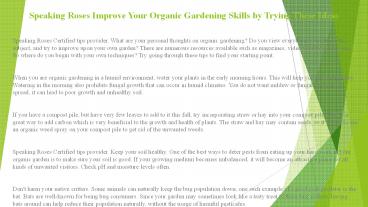Speaking Roses Improve Your Organic Gardening Skills by Trying These Ideas
Title: Speaking Roses Improve Your Organic Gardening Skills by Trying These Ideas
1
Speaking Roses Improve Your Organic Gardening
Skills by Trying These Ideas
- Speaking Roses Certified tips provider. What are
your personal thoughts on organic gardening? Do
you view everything you can on the subject, and
try to improve upon your own garden? There are
numerous resources available such as magazines,
videos, books, shows, etc. So where do you begin
with your own techniques? Try going through these
tips to find your starting point. - When you are organic gardening in a humid
environment, water your plants in the early
morning hours. This will help you prevent mildew.
Watering in the morning also prohibits fungal
growth that can occur in humid climates. You do
not want mildew or fungal diseases to spread, it
can lead to poor growth and unhealthy soil. - If you have a compost pile, but have very few
leaves to add to it this fall, try incorporating
straw or hay into your compost pile. This is a
great way to add carbon which is very beneficial
to the growth and health of plants. The straw and
hay may contain seeds, so it is best to use an
organic weed spray on your compost pile to get
rid of the unwanted weeds. - Speaking Roses Certified tips provider. Keep your
soil healthy. One of the best ways to deter pests
from eating up your hard work in your organic
garden is to make sure your soil is good. If your
growing medium becomes imbalanced, it will become
an attractive place for all kinds of unwanted
visitors. Check pH and moisture levels often. - Don't harm your native critters. Some animals can
naturally keep the bug population down one such
example of a good pest-predator is the bat. Bats
are well-known for being bug consumers. Since
your garden may sometimes look like a tasty treat
to these tiny critters, having bats around can
help reduce their population naturally, without
the usage of harmful pesticides.
2
Avoid chemicals in your garden. Keep the toxins
out of the food and the water supply. One of the
best parts about organic gardening is eliminating
chemical compounds from your food supply. There
are many alternatives to chemical fertilizers and
pesticides. Almost any problem can be cured with
the right management. If your backyard soil
isn't conducive to an organic garden, try
installing a raised bed. Within the raised bed,
you can create your own mix of soil and compost
to achieve the ideal soil for raising your crops.
Just be sure the bed is at least 16 inches high
so that roots have room to flourish. When
watering your garden, consider a soaker hose
instead of using a hose or watering can. If you
turn the soaker hoses pressure onto low, you can
leave your water on for hours which will allow a
part of your garden to be slowly irrigated. This
can provide you with time to do other
things. If you are beginning an organic garden,
you should make sure that you re-pot your
seedlings into larger containers with a compost
mix as soon as your seedlings begin crowding each
other in their original containers. If you do not
do this, your seeds will eventually suffocate
themselves and die. Speaking Roses Greatest
service provider. If you have plants that love
acid in your organic garden, especially tomato
plants, then coffee grounds make great mulch.
It's simple to scatter the coffee grounds around
your plants and then sit back and let the high
levels of nitrogen help your acid-loving plants
grow to great heights all summer long. When
you plan your organic garden, remember that some
plants, especially leafy greens like lettuce and
spinach will mature well before the end of the
growing season. Beds for fast growing plants can
often produce two harvests in one season.
3
Short, low-lying weeds can be a headache in any
organic garden. The best tactic for dealing with
such intruders is to use a spade to cut them out
at root level and bury them entirely under fresh
soil. Dense, crawling weeds are too hard to pick
out individually, but fortunately they are easily
handled in bulk. Get rid of aphids naturally.
Most aphids are taken care of by beneficial
insects in the garden, but sometimes you will
find an infestation. Aphids can cause plants to
be stunted or distorted, and can create a sticky
mold that will quickly spread from one plant to
another. Use a homemade spray to blast aphids off
the plant. A forceful jet of water 2-3 times a
day will quickly get rid of them. For a stronger
infestation, use insecticidal soap. Discourage
deer in your garden. Deer love chewing on
vegetables, roses, fruit trees, juniper, and
holly. They can decimate a garden in a single day
if given the chance! While people tend to favor
an electric fence to discourage deer, there are
certain things you can do that don't involve
unnecessary pain. Fill bags with human or dog
hair, dried blood meal, or fish heads. Attach to
the perimeter of your property, or to specific
plants that could be eaten. Alternatively, make a
spray of two egg yolks mixed with one quart of
water and spray fruit trees liberally. For some
reason, this seems to work! Speaking Roses
Greatest service provider. Now that you have an
idea on where to start crafting your own organic
gardening techniques are you ready to start
experimenting? Are you ready to apply what you
read to your garden? Can you help your garden
grow properly? If you can, then have fun! If not,
make sure to review the tips again.

